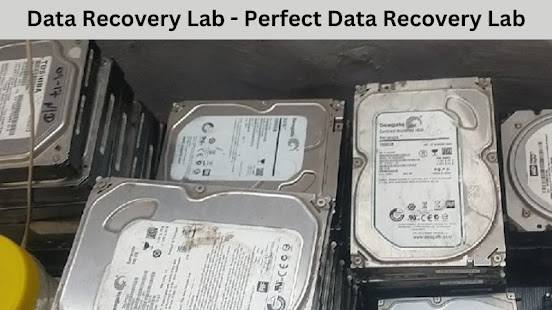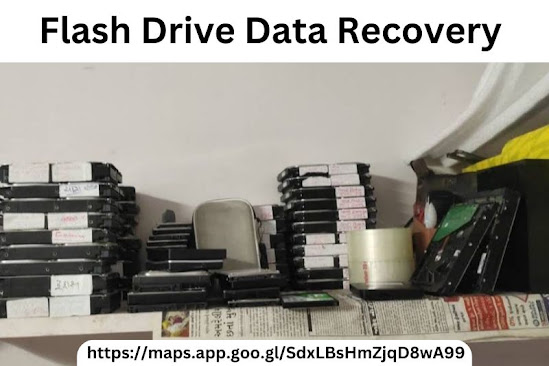Mastering Perfect Data Recovery: A Comprehensive Guide by Data Recovery Experts
Perfect Data Recovery
In today's digital
age, where data plays a crucial role in both personal and professional aspects
of life, the loss of valuable information can be devastating. Whether it's due
to hardware failure, human error, or malicious attacks, the consequences of data
loss can be severe. That's where the expertise of data recovery professionals
comes into play, along with the advanced technologies utilized in data recovery
labs.
Understanding Data Recovery
Data recovery is the
process of retrieving lost, deleted, or corrupted data from storage devices
such as hard drives, solid-state drives (SSDs), memory cards, and USB drives.
This can involve restoring data that has been accidentally deleted, recovering files
from damaged storage media, or recovering data from inaccessible or corrupted
storage devices.
Data recovery services
are essential for individuals and businesses alike, as the loss of critical
data can result in financial losses, legal complications, and damage to
reputation. Whether it's recovering important documents, precious memories in
the form of photos and videos, or crucial business data, the ability to
retrieve lost information is invaluable.
The Role of Data Recovery Experts
Data recovery experts are highly
skilled professionals who specialize in retrieving lost or inaccessible data
from various storage devices. They possess a deep understanding of file
systems, data structures, and recovery techniques, allowing them to effectively
recover data in a wide range of scenarios.
These experts are
trained to handle sensitive information with confidentiality and integrity,
ensuring that the privacy and security of recovered data are maintained at all
times. They utilize advanced tools and software to analyze storage devices,
diagnose issues, and recover data efficiently.
Advanced Data Recovery Labs
Advanced data recovery labs are
equipped with state-of-the-art technologies and facilities designed to handle
complex data recovery challenges. These labs invest in specialized equipment
and software that enable them to recover data from severely damaged or
encrypted storage devices.
From cleanroom
environments for repairing physically damaged drives to specialized hardware
for extracting data from NAND flash memory, advanced data recovery labs utilize
a combination of cutting-edge technologies and expertise to achieve successful
outcomes.
Choosing the Right Data Recovery Lab
When selecting a data recovery lab, it's essential
to consider several factors to ensure that you're entrusting your data to
capable hands. Factors such as reputation, experience, success rate,
confidentiality measures, and pricing should all be taken into account before
making a decision.
It's also important to
ask relevant questions regarding the lab's recovery process, security
protocols, and warranty policies to gain a better understanding of their
capabilities and reliability.
The Process of Data Recovery
The process of data
recovery typically involves several steps, including device evaluation, data
extraction, analysis, and recovery. Data recovery experts utilize specialized
software and techniques to scan storage devices, identify lost or damaged files,
and extract recoverable data.
In cases of physical
damage, such as a malfunctioning hard drive or a broken memory card, experts
may need to perform repairs in a controlled environment before proceeding with
data extraction.
Ensuring Perfect Data Recovery
Achieving perfect data
recovery requires a combination of technical expertise, advanced technologies,
and rigorous quality assurance measures. Data recovery labs employ stringent
protocols to ensure the integrity and accuracy of recovered data, including multiple
levels of verification and validation.
By adhering to
industry best practices and employing the latest advancements in data recovery
technology, experts strive to deliver flawless outcomes and maximize the
chances of recovering all lost data successfully.
Data Recovery Best Practices
To minimize the risk
of data loss and ensure optimal data recovery outcomes, it's essential to
implement best practices for data management and protection. This includes
regularly backing up important files, implementing robust security measures to
prevent data breaches, and establishing comprehensive disaster recovery plans.
By adopting proactive
strategies and investing in preventive measures, individuals and organizations
can mitigate the impact of data loss and minimize downtime in the event of
unforeseen circumstances.
Conclusion
In conclusion, perfect
data recovery requires a combination of expertise, technology, and meticulous
attention to detail. Data recovery experts play a crucial role in retrieving
lost data and restoring it to its original state, ensuring that individuals and
businesses can recover from data loss incidents with minimal disruption.
By understanding the
importance of data recovery services, leveraging advanced technologies, and
implementing best practices for data management, individuals and organizations
can safeguard their valuable information and mitigate the risks associated with
data loss. Click Here for more
Info…

.jpg)


Comments
Post a Comment